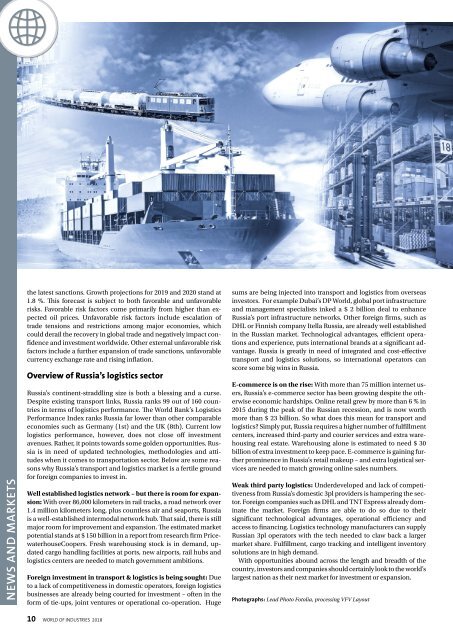WORLD OF INDUSTRIES 06/2018 (RU)
WORLD OF INDUSTRIES 06/2018 (RU)
WORLD OF INDUSTRIES 06/2018 (RU)
- No tags were found...
Create successful ePaper yourself
Turn your PDF publications into a flip-book with our unique Google optimized e-Paper software.
NEWS AND MARKETS<br />
the latest sanctions. Growth projections for 2019 and 2020 stand at<br />
1.8 %. This forecast is subject to both favorable and unfavorable<br />
risks. Favorable risk factors come primarily from higher than expected<br />
oil prices. Unfavorable risk factors include escalation of<br />
trade tensions and restrictions among major economies, which<br />
could derail the recovery in global trade and negatively impact confidence<br />
and investment worldwide. Other external unfavorable risk<br />
factors include a further expansion of trade sanctions, unfavorable<br />
currency exchange rate and rising inflation.<br />
Overview of Russia’s logistics sector<br />
Russia’s continent-straddling size is both a blessing and a curse.<br />
Despite existing transport links, Russia ranks 99 out of 160 countries<br />
in terms of logistics performance. The World Bank’s Logistics<br />
Performance Index ranks Russia far lower than other comparable<br />
economies such as Germany (1st) and the UK (8th). Current low<br />
logistics performance, however, does not close off investment<br />
avenues. Rather, it points towards some golden opportunities. Russia<br />
is in need of updated technologies, methodologies and attitudes<br />
when it comes to transportation sector. Below are some reasons<br />
why Russia’s transport and logistics market is a fertile ground<br />
for foreign companies to invest in.<br />
Well established logistics network – but there is room for expansion:<br />
With over 86,000 kilometers in rail tracks, a road network over<br />
1.4 million kilometers long, plus countless air and seaports, Russia<br />
is a well-established intermodal network hub. That said, there is still<br />
major room for improvement and expansion. The estimated market<br />
potential stands at $ 150 billion in a report from research firm PricewaterhouseCoopers.<br />
Fresh warehousing stock is in demand, updated<br />
cargo handling facilities at ports, new airports, rail hubs and<br />
logistics centers are needed to match government ambitions.<br />
Foreign investment in transport & logistics is being sought: Due<br />
to a lack of competitiveness in domestic operators, foreign logistics<br />
businesses are already being courted for investment – often in the<br />
form of tie-ups, joint ventures or operational co-operation. Huge<br />
sums are being injected into transport and logistics from overseas<br />
investors. For example Dubai’s DP World, global port infrastructure<br />
and management specialists inked a $ 2 billion deal to enhance<br />
Russia’s port infrastructure networks. Other foreign firms, such as<br />
DHL or Finnish company Itella Russia, are already well established<br />
in the Russian market. Technological advantages, efficient operations<br />
and experience, puts international brands at a significant advantage.<br />
Russia is greatly in need of integrated and cost-effective<br />
transport and logistics solutions, so international operators can<br />
score some big wins in Russia.<br />
E-commerce is on the rise: With more than 75 million internet users,<br />
Russia’s e-commerce sector has been growing despite the otherwise<br />
economic hardships. Online retail grew by more than 6 % in<br />
2015 during the peak of the Russian recession, and is now worth<br />
more than $ 23 billion. So what does this mean for transport and<br />
logistics? Simply put, Russia requires a higher number of fulfillment<br />
centers, increased third-party and courier services and extra warehousing<br />
real estate. Warehousing alone is estimated to need $ 30<br />
billion of extra investment to keep pace. E-commerce is gaining further<br />
prominence in Russia’s retail makeup – and extra logistical services<br />
are needed to match growing online sales numbers.<br />
Weak third party logistics: Underdeveloped and lack of competitiveness<br />
from Russia’s domestic 3pl providers is hampering the sector.<br />
Foreign companies such as DHL and TNT Express already dominate<br />
the market. Foreign firms are able to do so due to their<br />
significant technological advantages, operational efficiency and<br />
access to financing. Logistics technology manufacturers can supply<br />
Russian 3pl operators with the tech needed to claw back a larger<br />
market share. Fulfillment, cargo tracking and intelligent inventory<br />
solutions are in high demand.<br />
With opportunities abound across the length and breadth of the<br />
country, investors and companies should certainly look to the world’s<br />
largest nation as their next market for investment or expansion.<br />
Photographs: Lead Photo Fotolia, processing VFV Layout<br />
10 <strong>WORLD</strong> <strong>OF</strong> <strong>INDUSTRIES</strong> <strong>2018</strong>
















